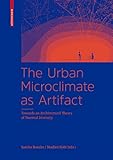The Urban Microclimate as Artifact : Towards an Architectural Theory of Thermal Diversity / Sascha Roesler, Madlen Kobi.
Material type: TextPublisher: Basel : Birkhäuser, [2018]Copyright date: ©2018Description: 1 online resource (200 p.) : 30Content type:
TextPublisher: Basel : Birkhäuser, [2018]Copyright date: ©2018Description: 1 online resource (200 p.) : 30Content type: - 9783035615463
- 9783035615159
- online - DeGruyter
| Item type | Current library | Call number | URL | Status | Notes | Barcode | |
|---|---|---|---|---|---|---|---|
 eBook
eBook
|
Biblioteca "Angelicum" Pont. Univ. S.Tommaso d'Aquino Nuvola online | online - DeGruyter (Browse shelf(Opens below)) | Online access | Not for loan (Accesso limitato) | Accesso per gli utenti autorizzati / Access for authorized users | (dgr)9783035615159 |
Frontmatter -- Contents -- Microclimates and the City -- Between Laboratory and Sea Ranch -- Citizens and Climate -- Indoor Urbanism -- Public Microclimates -- Thermal Sensations -- Thermal Layers -- Building a Brazilian Climate -- Heating and Cooling the Desert -- References -- Contributors -- Acknowledgments -- Illustration Credits -- Subject Index -- Place Index -- Name Index
restricted access online access with authorization star
http://purl.org/coar/access_right/c_16ec
Urban microclimates cannot be explained solely on the basis of scientific phenomena, but are also affected materially and spatially by the city’s local architecture. The layout, design, and facade construction of buildings have a major impact on wind and temperature conditions. For this reason, architecture and urban design that have an effect on microclimates must be investigated in their social and cultural contexts. The publication uses international case studies to explain these relationships. The focus is on manifestations of urban microclimates in an architectural and urban design context. The places investigated are located in France, Italy, the USA, New Zealand, the Philippines, Taiwan, and Burkina Faso.
Urbane Mikroklimata können nicht auf naturwissenschaftliche Phänomene reduziert werden, sondern sie werden auch durch die lokale Architektur der Stadt räumlich und materiell gestaltet. Anordnung, Entwurf und Fassadengestaltung von Gebäuden beeinflussen maßgeblich die Wind- und Temperaturverhältnisse. Architektonische und städtebauliche Maßnahmen zur Schaffung von Mikroklimata müssen deshalb in ihren sozialen und kulturellen Kontexten untersucht werden. Die Publikation erläutert diese Zusammenhänge anhand internationaler Fallstudien. Im Mittelpunkt stehen die architektonischen und städtebaulichen Manifestationen urbaner Mikroklimata. Die untersuchten Orte liegen in Frankreich, Italien, den USA, Neuseeland, den Philippinen, Taiwan und Burkina Faso.
Mode of access: Internet via World Wide Web.
In English.
Description based on online resource; title from PDF title page (publisher's Web site, viewed 30. Aug 2021)


